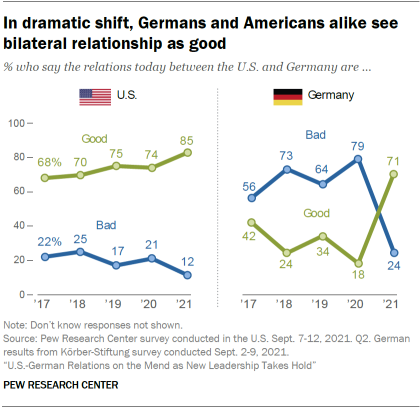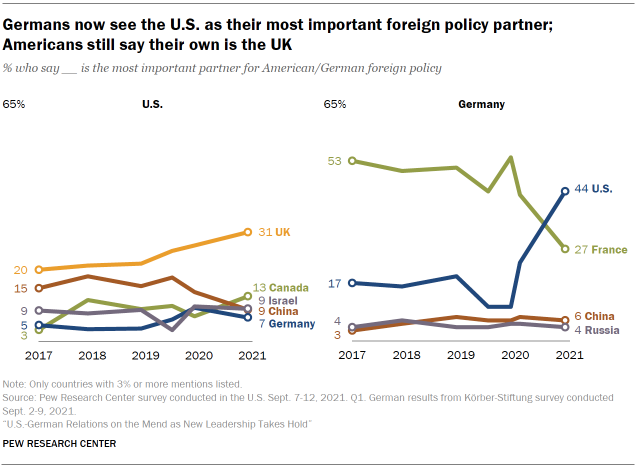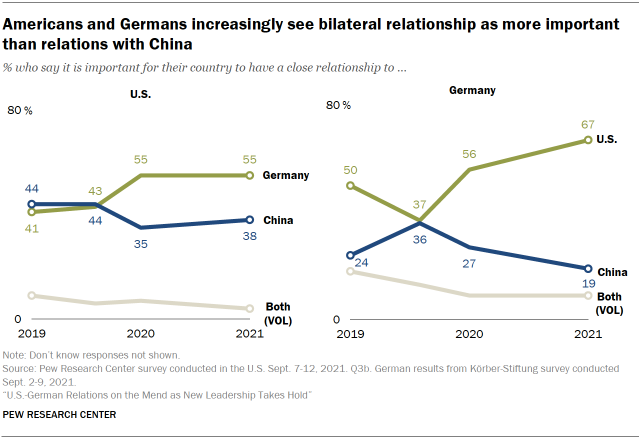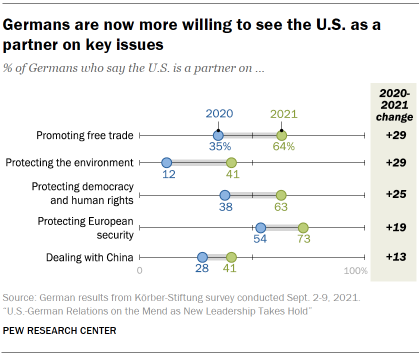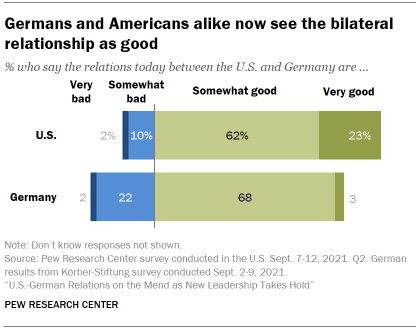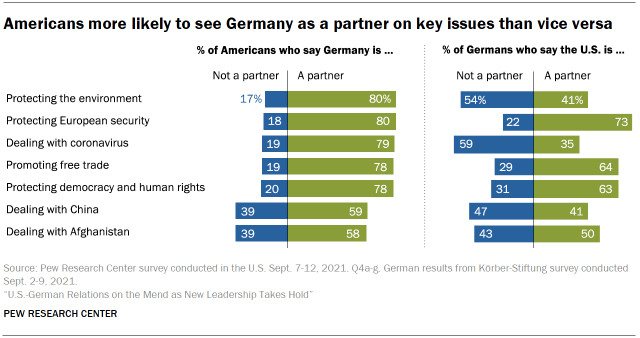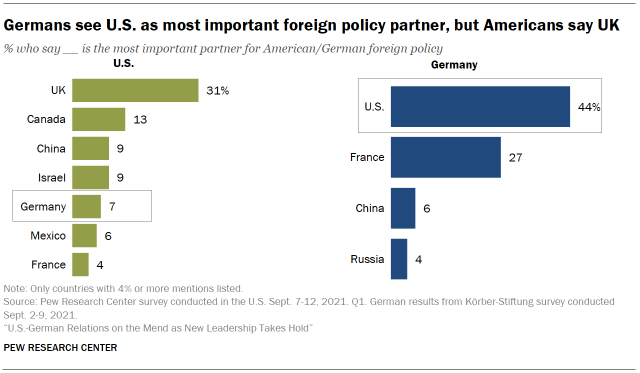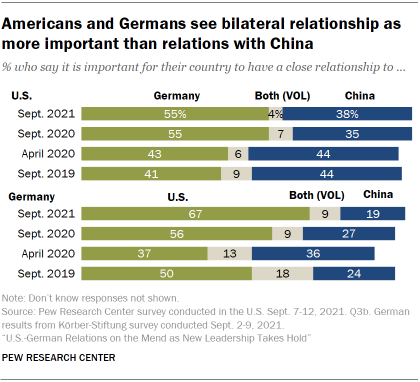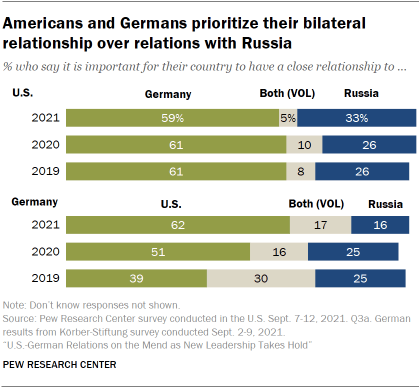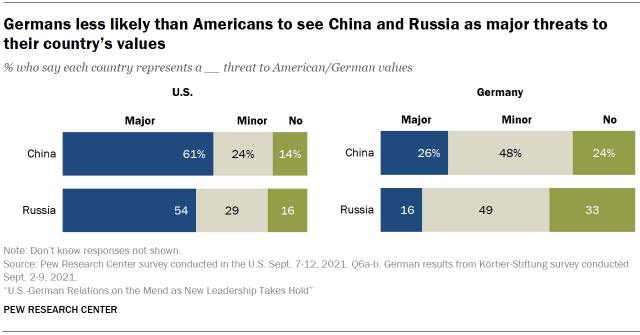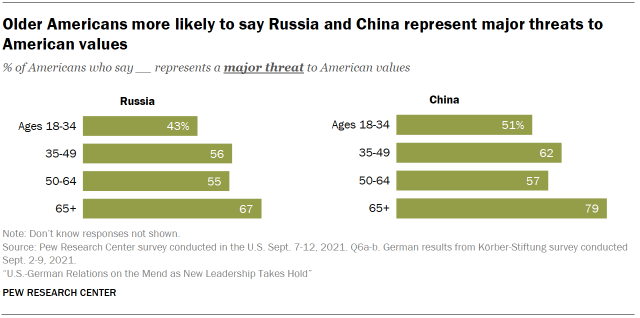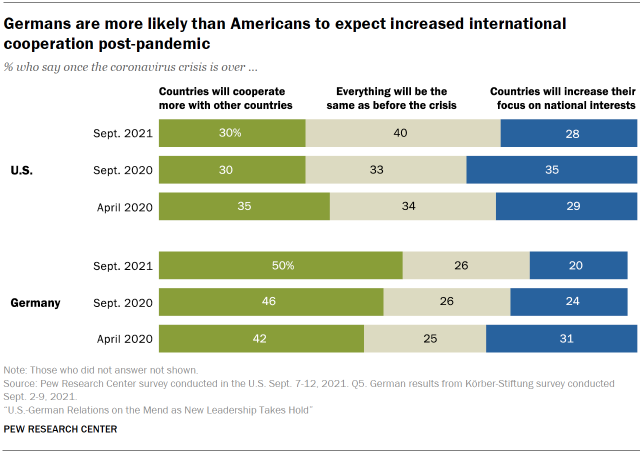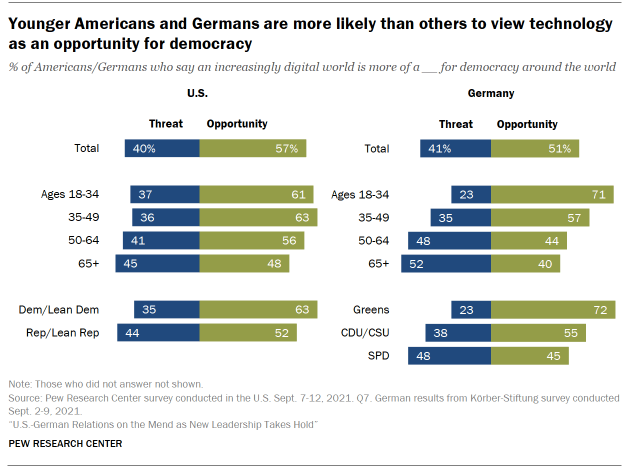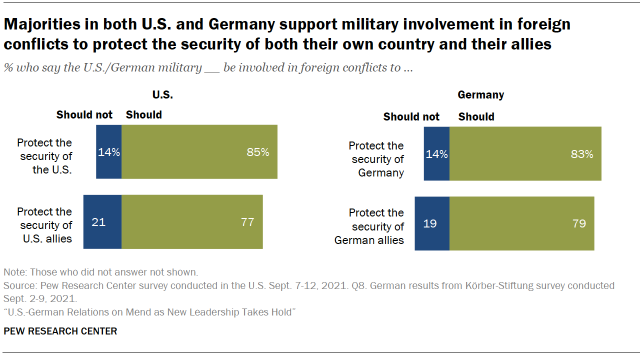Germans and Americans have both become more skeptical of China
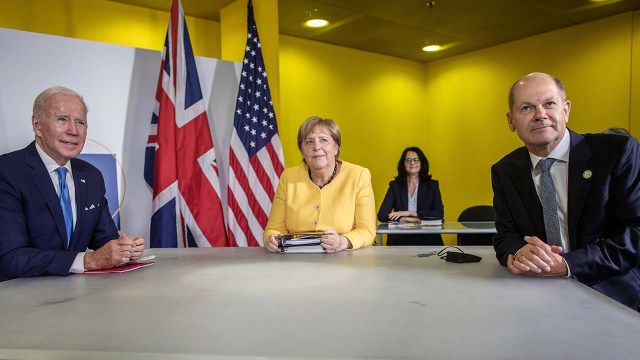
In 2017, Pew Research Center and Körber-Stiftung began collaborating on joint public opinion surveys to gauge the state of relations between the United States and Germany. The questions were developed jointly, and each organization fielded a survey within its own country starting that year. Some of the questions have been repeated annually to allow both organizations to track attitudes over time. Topics include relations with other countries, the state of the transatlantic partnership on a variety of foreign policy issues, views of China and Russia, and the state of international relations.
The results have been published in both countries, and the previous reports from Pew Research Center can be found here for September 2020, May 2020, March 2020, 2019 and 2018.
The Körber-Stiftung findings are contained within their larger “Berlin Pulse” report and can be found here for 2021, 2020, 2019 and 2018.
The September 2021 findings come from a Pew Research Center survey conducted by SSRS in the U.S. from Sept. 7 to 12 among 1,008 respondents and a Körber-Stiftung survey conducted by Kantar in Germany from Sept. 2 to 9 among 1,162 respondents.
Here are the questions used for this report, along with the responses, and its U.S. survey methodology.
A tumultuous year in the United States and Germany that included a transfer of political power for both countries has dramatically affected attitudes on the state of the bilateral relationship, according to a new joint survey conducted by Pew Research Center in the U.S. and Körber-Stiftung in Germany.
This fundamental shift in public opinion is most apparent in Germany, where the percentage saying that the U.S.-German relationship is in good shape has more than tripled from its Trump era lows and now stands at 71%. And 85% of Americans say that the relationship with Germany is good, up 17 percentage points since the question was first asked in 2017.
Germans have also shifted their preferred foreign policy partnerships away from longtime ally France and now see the U.S. as its most important partner. Currently, 44% of Germans see the U.S. as their preeminent ally, up from the 10% who said this as recently as September 2020, before the election of Joe Biden as president (attitudes toward the U.S. have improved dramatically since the election in many advanced economies, including Germany).
In the U.S., most people see the state of bilateral relations as good, and majorities of Americans continue to see Germany as a partner on all major foreign policy issues tested. Still, few Americans name Germany as the most important foreign policy partner, and far more Americans see the United Kingdom as their closest ally.
On one of the most salient international issues – China – Germans and Americans express somewhat different views. More Americans, for example, name China as a threat to their country’s values, while Germans are less concerned (61% vs. 26%, respectively). Older Americans are especially likely to see China as a threat to American values. In both countries, however, attitudes toward China have become significantly more negative in recent years.
And over the past two years, Germans have increasingly said their country’s relationship with the U.S. is more important than the one with China, while more Americans similarly prioritize the relationship with Germany over ties to China. Still, nearly four-in-ten Americans say the relationship with China is more important.
Respondents were also asked whether they see the other country as a partner on various international issues. Only 41% of Germans see the U.S. as a partner on China, while 59% of Americans say the same about Germany.
But overall, Germans are now much more willing to view their country as a partner to America on issues such as promoting free trade, protecting the environment, protecting democracy and human rights, protecting European security, and dealing with China. This is despite the fact that a majority of Germans say that the U.S. is not or has never been a good example for other democracies to follow.
Even with these improvements, many Germans say the U.S. is not a partner on dealing with the coronavirus pandemic (59%) or protecting the environment (54%). This aligns with other Pew Research Center polling showing that roughly four-in-ten Germans say the U.S. is doing a good job dealing with the COVID-19 pandemic and only two-in-ten say the U.S. is a doing a good job of dealing with global climate change. And on dealing with Afghanistan – for which the Biden administration was sharply criticized by the American public as troops departed in August – half of Germans still see the U.S. as a partner, while 58% of Americans see Germany as one.
Americans and Germans are more closely aligned on views of Russia, with majorities in each country saying they prefer a close bilateral relationship with each other rather than closer ties to Moscow. But as with China, fewer Germans see Russia as a threat. When it comes to the future of international relations, more Germans say that working with other countries will be more common after the coronavirus pandemic (50%) than Americans (30%).
Separately, when asked whether an increasingly digital world is a threat or opportunity for democracy, Americans and, to a lesser extent Germans, say it is an opportunity. But young people in both countries are much more likely to think technology is an opportunity for democratic values rather than a threat.
These are among the findings from a Pew Research Center survey of 1,008 adults conducted in the U.S. from Sept. 7-12, 2021, as well as a Körber-Stiftung survey of 1,162 adults conducted in Germany from Sept. 2-9, 2021. The surveys were both conducted before the German national election, which marked the end of Angela Merkel’s 16-year tenure as chancellor. For additional results from the Körber-Stiftung survey, access the newly released “Berlin Pulse” publication.
The bilateral relationship between the U.S. and Germany
Americans’ and Germans’ views of the relationship between their two countries are closer than at least since 2017, when the question was first asked. Large majorities in both countries now say the bilateral relationship is good.
With this shift, 71% of Germans now say relations with the U.S. are good, a 53 percentage point increase from 2020, when fewer than two-in-ten Germans said the same. Americans’ views of the relationship with Germany also grew rosier, as 85% now say the relationship is good (up 11 points from 2020) and only 12% say it is bad.
In the U.S., Democrats and Democratic-leaning independents are more likely than their Republican and Republican-leaning counterparts to say relations with Germany are good: 90% of Democrats say this while 79% of Republicans agree. Notably, this represents a 20-point increase since September 2020 in the share of Democrats who say the relationship with Germany is good. Republicans’ views of the bilateral relationship have not shifted much in that same time period.
The American-German partnership on key issues
In a marked change from last year, Germans are now much more likely to name the U.S. as a partner on a number of key issues. The shares of Germans who see the U.S. as a partner on protecting the environment and on promoting free trade have increased by 29 percentage points since 2020. Affirmative views of partnership have also risen by double digits in protecting democracy and human rights, protecting European security and dealing with China.
In 2021, 73% of Germans say the U.S. is a partner when it comes to protecting European security. Majorities also say the U.S. is a partner on promoting free trade and protecting democracy and human rights.
German views are more split on whether the U.S. is a partner or not on dealing with Afghanistan and with China. Half of Germans say the U.S. is a partner on Afghanistan, with 43% saying the U.S. is not a partner. Only about four-in-ten Germans say the U.S. is a partner on dealing with the world’s second largest economy. And while there has been a notable increase, just 41% of Germans say the U.S. is a partner when it comes to protecting the environment. An even smaller share (35%) of Germans say the U.S. is a partner on dealing with the coronavirus outbreak.
Americans, on the other hand, have been and remain vocal supporters of the U.S.-Germany partnership on these key issues. A majority of Americans consider Germany a partner on all the issues polled, with about eight-in-ten describing Germany as a partner on the environment, European security, the coronavirus, free trade and protecting democracy. When it comes to dealing with China and Afghanistan, however, Americans are slightly less enthusiastic about German partnership: About six-in-ten say Germany is a partner on these issues.
Even as about three-quarters among Republicans see Germany as a partner on protecting the environment, European security, democracy and human rights, and dealing with the coronavirus outbreak, Democrats are slightly more likely to consider Germany a partner on all of these issues.
Americans’ and Germans’ perception of foreign policy partners
Few Americans name Germany as their most important foreign policy partner (7%) despite holding positive views of the U.S.-German relationship. In contrast, more than four-in-ten in Germany name the U.S.
In a dramatic shift since 2020, 44% of Germans now see the U.S. as the most important foreign policy partner, while 27% name France. In previous years (2017 through 2020), four-in-ten or more Germans consistently listed France in the top spot.
In these past surveys, all of which were conducted during Donald Trump’s presidency, the U.S. was mentioned as a top partner by about two-in-ten or fewer Germans. In a November 2020 survey conducted after the election of Joe Biden to the U.S. presidency, only 23% of Germans had named the U.S. as their most vital foreign partner.
Among Americans, Germany remains a less frequently mentioned partner on foreign policy. Only 7% of Americans cite Germany as a key partner, whereas 31% mention the UK. A further 13% of Americans say Canada, and 9% respectively name China or Israel. However, 14% of Americans ages 18 to 34 say China is the most important policy partner.
In the U.S., Democrats are more likely than their Republican counterparts to name Canada as the most important foreign policy partner, while Republicans are more likely to name Israel.
Americans and Germans see bilateral relationship as more important than relations with China and Russia, but threat perceptions differ
As overall relations with the U.S. have improved, a growing share of Germans now say it is more important to have a close relationship with the U.S. rather than China. In the current survey, 67% of Germans say a strong relationship with the U.S. is more important than one with China. In April 2020, almost equal shares of Germans wanted a close relationship with either the U.S. (37%) or China (36%).
Since September 2020, a majority of Americans have preferred a close relationship with Germany rather than China. But, as recently as spring of 2020, nearly equal shares of Americans wanted a close relationship with China and Germany.
Young American adults are much more divided on this question than their older counterparts. Roughly equal shares of 18- to 34-year-olds surveyed say they prefer a closer relationship with China (47%) and Germany (46%). Among Americans 65 and older, 65% prefer being closer to Germany and 31% favor China.
Americans and Germans are more closely aligned on the importance of a relationship with Russia. Around six-in-ten in both the U.S. and Germany say they would choose to have a close relationship with each other rather than Russia.
This is in part due to an increasing share of Germans who pick the U.S. over Russia when it comes to bilateral relations. As recently as 2019, only 39% of Germans wanted to have a close relationship with the U.S. American public opinion on relations with Germany or Russia has held relatively steady over the same time period.
Americans with less education, Republicans and younger American adults are especially likely to say they want a close relationship with Russia rather than Germany, although in no instance does it constitute the majority opinion. In Germany, greater shares of older adults than younger adults and of those living in former East rather than former West Germany say they prefer Russia, but again this is not a plurality view.
Americans are far more likely than are Germans to view both China and Russia as substantial threats to their country’s values. Around six-in-ten Americans say China is a major threat to American values, as 54% say the same about Russia. But only around a quarter of Germans (26%) name China as a major threat to German values, with even fewer saying this about Russia (16%).
Older Americans are far more likely than younger Americans to see Russia and China as threats to American values. Two-thirds of Americans 65 and older say that Russia is a major threat to the country’s values, compared with 43% among those ages 18 to 34. Similarly, 79% of older Americans see China as a major threat to U.S. values, while 51% of younger Americans say this.
There is also a slight partisan division on the question of China as a threat to American principles. Republicans are more likely than Democrats to say China is a major threat to American values (71% vs. 56%).
Germans increasingly expect more international cooperation post-pandemic, but many in U.S. see return to status quo
The view that countries will cooperate more with other countries in the wake of the coronavirus pandemic has become more widespread in Germany since 2020, with 50% of Germans now saying this compared with 42% in spring 2020. Only one-in-five Germans now believe that countries will increase their focus on national interests once the coronavirus crisis is over, a drop from about one-in-three who said the same in spring 2020.
In Germany, a majority of women and those who support the Social Democratic Party (SPD) expect increased cooperation with other countries, while fewer than half say this among men and those who support Merkel’s Christian Democratic Union and its Bavarian partner (CDU/CSU).
In the U.S., views that international cooperation will increase have remained relatively steady since 2020, but a plurality of Americans (40%) now say that everything will be the same as prior to the crisis when it comes to international relations.
Both Germans and Americans consider an increasingly digital world as an opportunity for democracy
In both Germany and the U.S., at least half of those surveyed consider an increasingly digital world to be an opportunity for democracy around the world, rather than a threat, with slightly more people in the U.S. saying this than in Germany.
In the U.S., younger people are more likely to believe that an increasingly digital world is an opportunity for democracy. Around six-in-ten of those ages 18 to 34 say a more digital world is an opportunity for democracy, compared with roughly half of those 65 and older who agree.
Similarly, in Germany, roughly seven-in-ten of those 18 to 34 say that an increasingly digital world is an opportunity for democracy around the world, compared with 40% among those 65 and older. Older adults in Germany more commonly say that an increasingly digital world is a threat to democracy, with around half of those older than 65 saying this in contrast to roughly one-quarter of those 18 to 34.
About half or more of both Republicans and Democrats in the U.S. believe that technology is more of an opportunity than a threat to democracy around the world. However, Democrats are somewhat more likely than Republicans to say technology is an opportunity for democracy (63% vs. 52%). Only about a third of Democrats see an increasingly digital world as a threat to democracy, while 44% of Republicans see it as a threat.
In Germany, too, there are differences by party. Nearly three-quarters of those who preferred the center-left Greens in the Bundestag election believe that an increasingly digital world is an opportunity for democracy around the world, as opposed to 55% of center-right CDU/CSU supporters and 45% of SPD supporters.
Americans and Germans agree on using military force to protect themselves and allies
Despite the abrupt pullout of NATO troops from Afghanistan in August 2021, both Americans and Germans are in strong agreement that their countries should use the military in foreign conflicts to protect the security of their country and its allies. Over eight-in-ten in both countries say military force should be used to protect the security of their own country. Slightly fewer in each country agree that military force should be used to protect American and German allies, but overwhelming majorities still say this.
